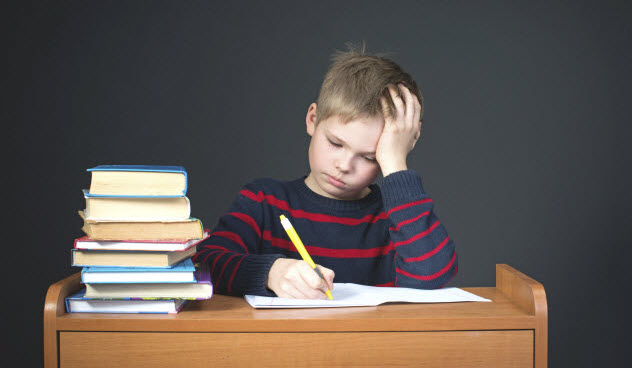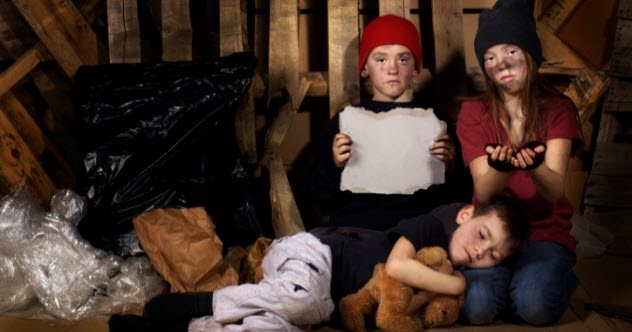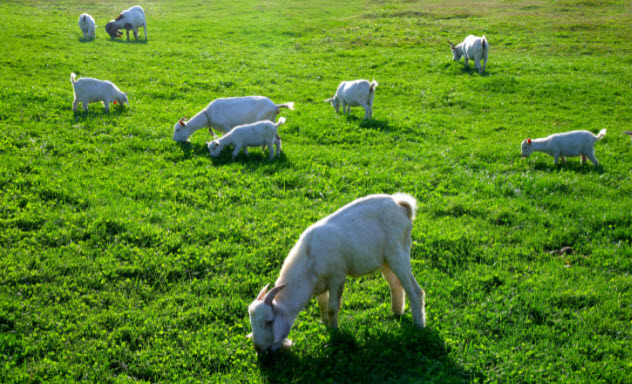 Health
Health  Health
Health  Travel
Travel 10 Unique Speakeasies Around the World
 Miscellaneous
Miscellaneous 10 Unbelievable News Headlines Surrounding Breakfast
 Movies and TV
Movies and TV 10 Non-musical Films with Epic Musical Scenes
 Our World
Our World 10 Amazing Indicator Species That Reveal Environmental Truths
 Mysteries
Mysteries 10 Puzzles of Evolution That Scientists Still Can’t Explain
 Gaming
Gaming 10 Video Games That Were Scrapped Close to Completion
 Music
Music 10 Mystifying Myths About Rock Stars… That Are Actually True
 Weird Stuff
Weird Stuff 10 Amazingly Ancient Jokes That Might Still Make You Laugh
 Misconceptions
Misconceptions 10 Saint Patrick’s Day Traditions That Aren’t Really Irish
 Health
Health 10 Severe Medical Conditions with Surprising Health Benefits
 Travel
Travel 10 Unique Speakeasies Around the World
 Miscellaneous
Miscellaneous 10 Unbelievable News Headlines Surrounding Breakfast
Who's Behind Listverse?

Jamie Frater
Head Editor
Jamie founded Listverse due to an insatiable desire to share fascinating, obscure, and bizarre facts. He has been a guest speaker on numerous national radio and television stations and is a five time published author.
More About Us Movies and TV
Movies and TV 10 Non-musical Films with Epic Musical Scenes
 Our World
Our World 10 Amazing Indicator Species That Reveal Environmental Truths
 Mysteries
Mysteries 10 Puzzles of Evolution That Scientists Still Can’t Explain
 Gaming
Gaming 10 Video Games That Were Scrapped Close to Completion
 Music
Music 10 Mystifying Myths About Rock Stars… That Are Actually True
 Weird Stuff
Weird Stuff 10 Amazingly Ancient Jokes That Might Still Make You Laugh
 Misconceptions
Misconceptions 10 Saint Patrick’s Day Traditions That Aren’t Really Irish
10 Fascinating Insights Into Life In Poverty
With the global divide between the rich and the poor widening all the time, chances are good that you know someone struggling to get by, just making ends meet, and figuring out what corners can be cut to make it through another month.
SEE ALSO: 10 Good Reasons to Embrace Poverty
In 1964, President Lyndon B. Johnson famously declared war on poverty, but decades later, it’s a war that we don’t seem to be winning. Now, we’re gaining more scientific and psychological insight into just what it means to be poor and what kind of impact poverty has on people.
10 Shrinking Children’s Brains
In the US, it’s estimated that children make up about 24 percent of the total population and about 36 percent of the population living below the poverty line. That’s a lot of children, so it’s important to understand the impact of poverty on such a vulnerable group. In 2015, a study showed that being born into—and growing up in—poverty has a measurable impact on brain development right from birth.
Columbia University and Children’s Hospital Los Angeles conducted a study on more than 1,000 children growing up in different income brackets, and they found something staggering. The children growing up in the lowest of those brackets had as much as 6 percent less surface area to their brains compared to children growing up in higher-income families.
As income decreased, the researchers found major differences among children raised in low-income families, even when annual incomes differed by as little as a few thousand dollars. The difference was visible in children who were as young as only a few months old. In addition, children continued to show slower growth in areas of the brain governing things like decision-making, reading, and language.
Researchers haven’t yet studied how changes in circumstances might alter brain development or what specific circumstances are impacting infant brain development. However, there are plenty of thoughts on just what’s causing it—from parents needing to work two jobs to having less quality time to spend with their children to chronic stress during fetal development.
9 Sleep Deprivation
The stress that goes with trying to figure out how you’re going to pay the next round of bills is very real. Studies have shown that those living in poverty are often suffering from chronic sleep deprivation that comes from poor quality sleep rather than fewer hours of sleep.
When University of Pennsylvania researchers decided to look at how poverty impacted the quality of sleep, they found a definite correlation between income and restless sleep. After dividing more than 9,700 subjects into groups based on race and income, the researchers looked at how other things usually associated with poverty—like obesity and poor health—impacted overall individual sleep quality.
The findings were strange. Below the poverty line, minority groups were more likely to get worse sleep than white participants. However, African-American participants above the poverty line were getting worse sleep than those below it.
As this was one of the first studies to analyze the quality versus the quantity of sleep, it raised more questions about the psychological, sociological, and environmental factors that impact different groups above and below the poverty line. It also raised some intriguing questions about the cycle of poverty and how those trapped in it suffer from physical and psychological effects that are sabotaging efforts to escape the cycle. We’ve all had some bad nights’ sleep, but when that becomes chronic, it leads to many other problems, one of which might be closely linked to poverty.
Another study in Buenos Aires looked at the sleep patterns of slum dwellers who moved to prefabricated homes as part of a nonprofit organization’s housing program. Once they made the move, sleep quality and physical health increased greatly.
8 How Casinos Hurt Reservations

We all know that when it comes to casinos, the house always wins. So legalized gambling should, in theory, be benefiting those living on reservations in the US. But it’s not.
The American Indian Law Journal analyzed 24 tribes in the Pacific Northwest. From 2000 to 2010, they took in $2.7 billion, even though the poverty rate rose as much as 21 percent to 38 percent.
There are many possible explanations, including alcoholism and chronic health problems, for why people spiral down the rabbit hole of poverty. But in these cases, a likely explanation may involve money from casinos that is handed out in per capita payments, often in lump sums. Depending on the tribe, yearly payments can range from a couple of hundred dollars to more than $100,000. While that might seem like a lot, it’s actually not helping the recipients. Lump-sum payments may discourage people from looking for regular jobs.
That theory is supported by the Jamestown S’Klallam tribe, which eliminated both per capita payments and poverty. Instead of handing money to its people, the tribe took the casinos’ profits and reinvested them into other businesses. For example, they invested in a mollusk harvesting business that became a massive export enterprise. Compare that to the Siletz tribe, which has one of the highest poverty rates among the studied tribes and one of the highest per capita payouts of casino profits.
7 Poverty Causes Hormonal Imbalances
Cortisol is a hormone produced by the adrenal system. In normal amounts, it helps to regulate our body’s reaction to stress. However, too much cortisol is associated with a drop in bone density and muscle mass, an increased tendency to store body fat, a compromised immune system, and problems maintaining blood sugar levels. Scientific studies have linked poverty to these higher, unhealthy levels of cortisol.
One study of farmers and city-dwelling nonfarmers in Kenya looked at the link between rain and the body’s production of cortisol. Rain is crucial to the welfare of farmers, as drought conditions can destroy a food crop and wipe out their source of income. Rain is not as important to city dwellers because they look elsewhere for their income. In this case, most were metal workers.
Researchers found that environmental and situational stressors that impact the finances of people who are already strapped can create physical problems that make their situations worse. For example, when farmers knew that a particular weather condition would cause a drop in their already-meager incomes, they experienced a massive spike in stress and cortisol levels. This confirms that the stress of poverty is strongly linked to hormone production in the body and the resulting negative effects.
6 Impaired Memory In Children

Working memory is the kind of memory we use to function every day. It’s how we receive, hold, and process information in the moment. Studies have shown that growing up in poverty impacts the function of working memory in children to a surprising degree.
A group of sixth-grade students was divided into rural and urban dwellers, then further subdivided by low or high family income. Each group had their visuospatial and verbal working memories tested. Researchers found that different types of poverty have different impacts on the working memories of children who are raised in it.
The low-income children raised in a city environment demonstrated weakness in their symmetric working memories, including low scores in verbal memory. That may be partly explained by their constant exposure to noise pollution. On the other hand, low-income children raised in a rural setting scored much lower in their visuospatial memory than in their verbal memory. This finding further supports the theory that noise pollution is linked to the memory problems of the city children.
High-income children that were given the same tests didn’t show any of the defects in memory that the low-income children did, suggesting that the environmental factors of income—and likely the stress of being in a low-income environment—account for the difference in the children’s abilities.
5 Different Types Of Poverty

All poverty is not created equal. Although everyone’s circumstances are different, there are six main types of poverty, all with different causes and characteristics.
In cities with populations of more than 50,000, urban poverty exists where people suffer the effects of overcrowding or violence and rely on city services for survival. In contrast, rural poverty exists in areas with populations of fewer than 50,000 and is often characterized by services that are inaccessible. As a result, many people are forced into poverty because jobs are nonexistent or too far away.
Absolute poverty is the sort of poverty you see on television, where people don’t have access to the most basic of human needs, like fresh water and shelter. On the other hand, relative poverty is much more common in places like the US, where people can’t afford to live at their country’s accepted standard of living.
Generational poverty is just what it sounds like—families that struggle with poverty, generation after generation, unable to escape. There’s also situational poverty, where a family or individual is suddenly forced into poverty by something like a medical emergency or other crisis.
Some of these types of poverty exist alongside each other, but it’s a stark reminder that not everyone’s situation is the same. The answer to escape the cycle of poverty isn’t the same, either.
4 Poverty And Religion

If you overlay a map of the US with the most difficult places to earn a livable income and make ends meet, you’ll find a distinct overlap with some of the most religious areas of the country. According to the New York Times, as of 2014, a group of 10 counties in the Appalachian Mountains ranked among the most difficult places to live.
If you look at their Google searches, they search for subjects within a narrow theme, including things like the Rapture, Hell, and the Antichrist. While the correlation itself doesn’t supply us with a reason for it, one suggestion as to why poverty and religion go hand in hand is pretty depressing. Religion creates not only a justification for people’s suffering and hardships, but also a promise for something better. Religion—and the end of the world—can also come as something of a relief. In this view, the actual end might be bad, but so is life. With the end comes salvation.
However, other studies have shown that higher poverty levels don’t always correlate to stronger religious beliefs. In a 2009 study that analyzed the social infrastructure, wealth, and religious beliefs of 50 different countries, researchers found that religious belief is tied not only to poverty, but also to personal insecurity. The more religious a country, the less secure its people, whether financially or physically. In part, the distribution of wealth also impacts how religious people are.
In a country where there’s a huge difference in equality, the society is more likely to be religious. The more people who believed in God and the Devil, the higher that country was on the scales of things like murder, abortion rates, corruption, and what researchers called “social disharmony.” For poor people who don’t believe they have options, religion becomes a much-needed lifeline that helps them to believe that things will eventually get better, even if they have to die to enjoy it.
3 A Remedy That Works

Fighting poverty is an uphill battle, but finding a strategy that works is also a challenge. According to a study headed by Yale researchers, the key to getting people out of the cycle of poverty isn’t giving them money, it’s giving them tools.
Nearly 11,000 people in Peru, India, Honduras, Ghana, Pakistan, and Ethiopia participated in a randomized study to see if people could get themselves out of poverty if they were given the right guidance and tools.
In Ghana, families designated as ultra-poor were given a one-time deal of about $450 worth of product. They could choose from goats and hens, goats and corn, or shea nuts and hens. They were then given all the tools they needed to become successful. If they were raising animals, they were taught about animal health, breeding, and veterinary care. They were also enrolled in a national health insurance plan. Finally, throughout the two-year experiment, they received regular instruction on subjects ranging from savings accounts to nutrition.
The experiment worked. Not only were these families more successful, more comfortable, and healthier, they were able to eat better, save money, and work throughout the year. Benefits continued after the program ended, suggesting that the way to end poverty isn’t to give money or food, but to give people the tools to build their own futures.
2 Impaired Brain Activity
Poverty causes stress, impacting overall health and well-being if continued in the long run. But poverty has also been shown to have a direct, measurable impact on brain function.
Preoccupation with financial problems can cause your brain to function as though your IQ is 13 points lower or you’ve gone an entire night without sleeping. That may cause people who are struggling financially to miss appointments, forget important things, or make bad financial decisions.
Poverty forces people to think about getting through the moment, putting long-term plans on the back burner. According to researchers, each person only has so much cognitive function at any given time. The stress of financial worries will take up most of what we have.
We saw this in a study that looked at sugarcane farmers in India. Due to the crop cycle, farmers get all their wealth in one windfall after the harvest. They go from rich to poor in a yearly cycle. Measuring their IQs during periods of wealth and poverty showed there was an average 13-point drop when people were preoccupied with financial worries. Researchers also found that they couldn’t just chalk up the difference to stress because there was stress both before and after the harvest. However, there was only poverty before the harvest, meaning that poverty creates a different sort of stress that’s much harder to handle.
Researchers were quick to point out that poverty doesn’t make people less intelligent. But impoverished people may fail at everyday tasks because of the enormous mental drain from dealing with their situation.
1 The Psychology Of Bad Decisions

Poverty is often considered to be a dirty word, with poor people seen as causing their own problems by being lazy or flawed in some way. Although some people will do whatever is needed to get out of the cycle, others spend money on the latest mobile phones while unable to buy groceries.
According to University of Pennsylvania neuroscientists, the reason people respond differently has to do with self-control and time. If you’re not sure that delaying your gratification will pay off in time, then there’s no need to wait for a particular outcome.
Weight loss strategies are a good example. Suppose you continue to pass on those tempting chocolate brownies, that ice cream, and that Friday night pizza to lose weight. At the end of the month, if you haven’t lost as much weight as expected, how likely will you be to keep depriving yourself of all those tasty treats during the next month?
The same principle applies to being poor. When you no longer see a way out of poverty, you simply give up. You treat yourself when you can. Even if it’s short-lived, you know that’s all that you’ll ever get. Planning for the long term may not seem like an option, leading to one bad decision after another. From the outside, that type of behavior seems irresponsible. However, from the inside, it seems perfectly logical.








